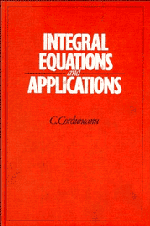Book contents
- Frontmatter
- Contents
- Preface
- Introduction
- 1 Introduction to the theory of integral equations
- 2 Function spaces, operators, fixed points and monotone mappings
- 3 Basic theory of Volterra equations: integral and abstract
- 4 Some special classes of integral and integrodifferential equations
- 5 Integral equations in abstract spaces
- 6 Some applications of integral and integrodifferential equations
- References
- Index
5 - Integral equations in abstract spaces
Published online by Cambridge University Press: 26 March 2010
- Frontmatter
- Contents
- Preface
- Introduction
- 1 Introduction to the theory of integral equations
- 2 Function spaces, operators, fixed points and monotone mappings
- 3 Basic theory of Volterra equations: integral and abstract
- 4 Some special classes of integral and integrodifferential equations
- 5 Integral equations in abstract spaces
- 6 Some applications of integral and integrodifferential equations
- References
- Index
Summary
The theory of integral equations in Banach/Hilbert spaces is more recent than the theory of integral equations in finite-dimensional spaces. Practically, the theory of integral equations in infinite-dimensional spaces, involving not necessarily bounded operators, has come to life during the 1970s and 1980s. Most of the significant contributions were made in the 1980s, especially with regard to the various applications found for such equations in applied science (primarily, in continuum mechanics).
Several approaches can be encountered in the literature on this subject: fixed point methods in various function spaces, in relation to the existence problem; use of the concept of measure of noncompactness; semigroup theory; construction of the resolvent kernel, and its applications; transform theory methods. Classical types of Volterra equations, various classes of integro-partial differential equations, and to some extent abstract Volterra equations (i.e., involving an abstract nonanticipative operator) have been investigated by many authors. This kind of research illustrates the growing role of Volterra equations as mathematical models for evolution phenomena.
To date, there are only a few references in book form, related to Volterra equations in infinite-dimensional spaces: Hönig, Prüss, and Renardy, Hrusa and Nohel. This last book particularly illustrates semigroup methods in the mathematical theory of viscoelasticity, but has also a good many basic theoretical results.
The aim, in this chapter, is to provide results relating to the above mentioned directions of research, and illustrate the methods that have already been successfully applied to further the investigation in this area.
Information
- Type
- Chapter
- Information
- Integral Equations and Applications , pp. 222 - 272Publisher: Cambridge University PressPrint publication year: 1991
